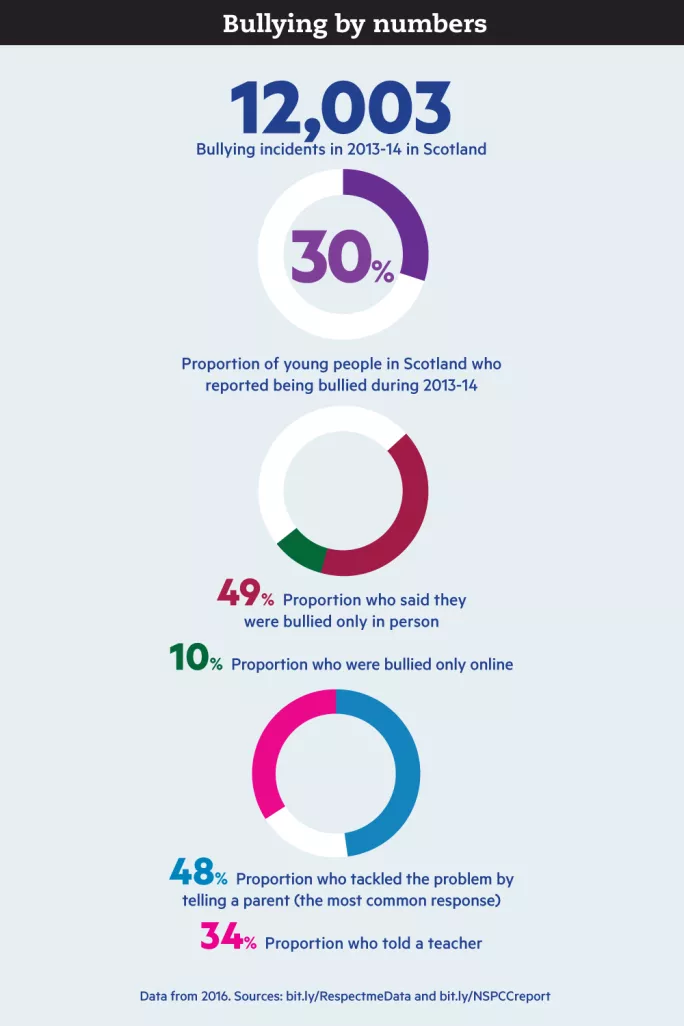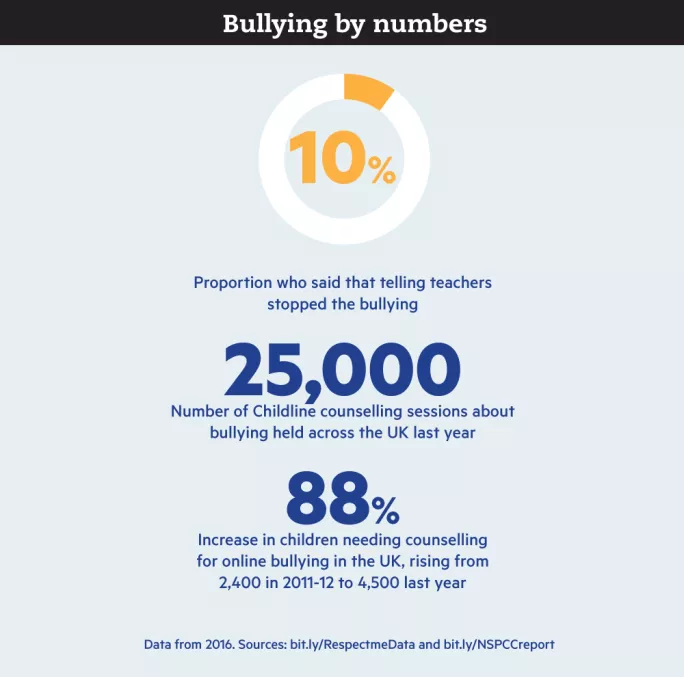‘We need to hold the line on what is acceptable’

When Donald Trump’s lewd comments about women - which he dismissed as “locker-room banter” - came to light, they quickly spread all over the news. Other campaign lows also garnered huge amounts of attention, including the now president-elect pledging to ban all Muslims from the US and mocking a disabled journalist.
Meanwhile, on these shores, the vote in June to break away from the European Union was fuelled by the pro-leave lobby preying upon people’s fears of migrants and refugees.
Scotland did not vote for Brexit, but schools have still had to deal with the fallout from the vitriol spouted during the build-up to the EU referendum, according to headteacher Stephen Miller. America’s decision to elect Trump will also have an impact in classrooms and playgrounds, he believes.
Anything out there in the media and in communities comes into schools
Miller has been rector of Denny High in Falkirk for almost a decade. Up until this year, he had dealt with only two racist incidents, but in June alone there were three, which he directly links to the referendum.
“I have no doubt that the climate in the wider world has affected some relationships adversely”, he says, “and that there is a greater willingness of pupils to feel they can express viewpoints that would not have been the case before the Brexit debates.
“Schools need to stand firm on our beliefs and values. And, as educators, it is our job to explain to pupils and hold the line in terms of what is acceptable and unacceptable.
“It is a strange irony that the leader of the free world [elect] has felt free to express these views. There is a need to explain to pupils that, just because a powerful person is expressing these views, it does not make them right.”
Researchers from the Moray House School of Education at the University of Edinburgh recently told the Scottish Parliament’s Equalities and Human Rights Committee that there was a “growing mood” among some pupils and parents that discriminatory language and views were acceptable.
Discussions with teaching staff had also revealed that some parents were more likely to excuse behaviour, such as racial bullying, by using phrases such as “it happens all the time” and “[it’s] just unfortunate my daughter was caught”.
“Race needs to be explicitly back on the agenda,” the researchers argued.

Experts giving evidence expressed concern about teachers’ confidence when dealing with racist or homophobic bullying. They were also worried about under-reporting of incidents, as well as inconsistency across schools and councils about what was recorded.
As a result of the committee’s findings, the Scottish government has put the publication of its refreshed anti-bullying guidance for schools on hold. But some extremely good work is already going on in schools, the committee acknowledged.
However, recent events in the wider world will undoubtedly mean that teachers have to work harder at promoting tolerance and respect, believes Ann McIntosh, a past president of primary school leaders’ body the AHDS and headteacher of Knightswood Primary in Glasgow.
“Schools across Scotland work really hard on positive behaviour management, restorative practices and values work, but a number of influences from outside don’t help us,” McIntosh says. “When you investigate a bullying incident, it tends to be the case that the children are repeating the stuff they have heard adults say - people on TV or people in the community, parents or grandparents.
“Anything out there in the media and in communities comes into schools.”
Ethos and culture
Brian Donnelly, chief executive of anti-bullying service Respectme, says that the solution lies in “creating environments where bullying cannot thrive”.
In research conducted by the organisation, pupils reported that the most successful interventions were those that tackled the ethos and culture of the school, rather than just focusing on individual incidents when they occurred. Interventions such as buddying, mentoring and having clear anti-bullying policies were seen as more effective than reporting forms, worry boxes and playground monitors.
Respectme has been working with Fife Council, which flags up Burntisland Primary - its biggest primary with more than 550 pupils and 21 classes - as having a positive ethos. The school is firmly rooted in the community, says head Julie Anderson. Not only is it the town’s sole primary but she is a former Burntisland pupil and lives in the area, while her daughter, Alice, is in P6 at the school.
“A few people were surprised that I would want to live and work in the same town,” Anderson says. “But when you see the children out and about - at the swimming pool, at clubs, at the Remembrance Day parade - you can connect back. You know each other as people and school is not a place you go that is separate from the other things.”

However, she is keen to stress that the school’s positive ethos is a team effort and she heaps praise on her staff.
“For us, it is about relationships and firm foundations, where everybody works together,” Anderson continues. “If you ask any of our kids what our big thing is, they’ll tell you it’s about being kind - being kind to yourself and others, and to the school.”
Huge posters (10ft tall by 20ft wide) are scattered throughout the school to send positive messages to the children. These include “we are a team”, “we are confident” and “we talk things through to solve difficulties”.
“It’s about the psychology of priming,” Anderson explains. “If you are surrounded by positive images, it makes you feel better and you aspire to be these things.
“I’m not saying there is no bullying here, but when there are problems, people can talk things through, be open and honest and resolve through discussion.”
Restorative justice
Anderson has never excluded a child and is an advocate of restorative approaches, which concentrate on how a situation can be put right as opposed to doling out punishments. The school is active on social media to keep parents engaged with the work it is doing. Every Monday at assembly, children are given a “big talk” topic to discuss at home, and they share their thoughts the following week.
The school delivers a PSHE programme called Mind, Heart and Body, setting has been scrapped and “golden time, stickers or points” are banned, Anderson says.
“Children often come to realise that these behaviour systems are flawed, because if there is a child who has a tendency to misbehave, they get a sticker the second they start behaving,” she explains. “Meanwhile, children who trundle along not being any trouble end up being overlooked or missed. You end up with children who are motivated by getting stuff.”
That tyranny of attainment is culturally corrosive
Although secondaries are on a larger scale than primaries, it should be equally possible to make all pupils feel valued if proper pastoral systems are in place, says Peter Reid, headteacher of Broxburn Academy in West Lothian, which was one of the first secondaries in Scotland to introduce a nurture base.
However, the “tyranny of attainment” means that schools - and secondaries in particular - often focus on academic results above all else, according to Bill Ramsay, convener of the EIS teaching union’s equality committee. By the senior secondary years, that focus becomes “like a tractor beam” and everything else has lower priority, he says.
“To me, that tyranny of attainment is culturally corrosive,” Ramsay adds.
Other barriers to schools becoming better at tackling bullying, he notes, include a lack of money and supply cover to enable teacher training on the topic.
You need a Tes subscription to read this article
Subscribe now to read this article and get other subscriber-only content:
- Unlimited access to all Tes magazine content
- Exclusive subscriber-only stories
- Award-winning email newsletters
Already a subscriber? Log in
You need a subscription to read this article
Subscribe now to read this article and get other subscriber-only content, including:
- Unlimited access to all Tes magazine content
- Exclusive subscriber-only stories
- Award-winning email newsletters